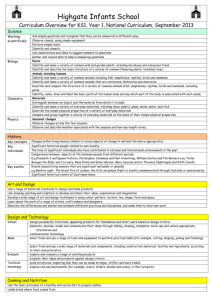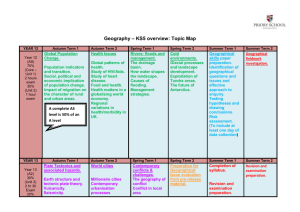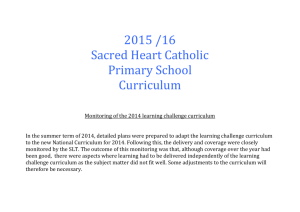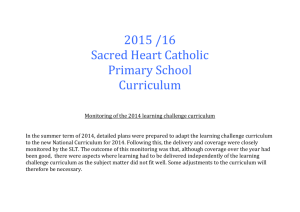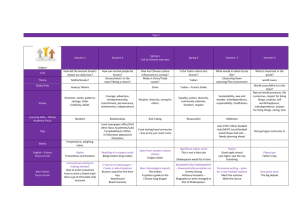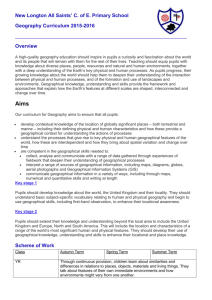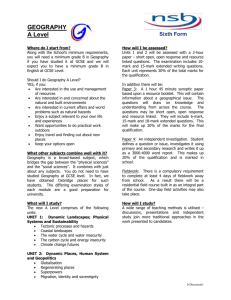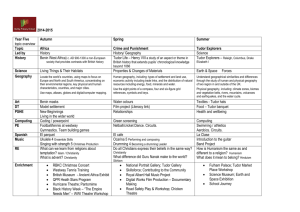Queens Academy Long School Planning Overview
advertisement
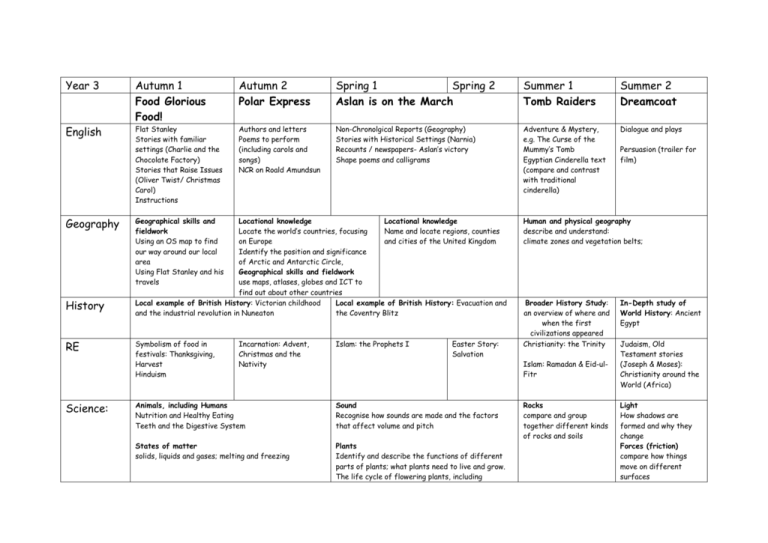
Year 3 Autumn 1 Food Glorious Food! Autumn 2 Polar Express Spring 1 Spring 2 Aslan is on the March Summer 1 Tomb Raiders Summer 2 Dreamcoat English Flat Stanley Stories with familiar settings (Charlie and the Chocolate Factory) Stories that Raise Issues (Oliver Twist/ Christmas Carol) Instructions Authors and letters Poems to perform (including carols and songs) NCR on Roald Amundsun Non-Chronolgical Reports (Geography) Stories with Historical Settings (Narnia) Recounts / newspapers- Aslan’s victory Shape poems and calligrams Adventure & Mystery, e.g. The Curse of the Mummy’s Tomb Egyptian Cinderella text (compare and contrast with traditional cinderella) Dialogue and plays Geography History RE Science: Geographical skills and fieldwork Using an OS map to find our way around our local area Using Flat Stanley and his travels Locational knowledge Locational knowledge Locate the world’s countries, focusing Name and locate regions, counties on Europe and cities of the United Kingdom Identify the position and significance of Arctic and Antarctic Circle, Geographical skills and fieldwork use maps, atlases, globes and ICT to find out about other countries Local example of British History: Victorian childhood Local example of British History: Evacuation and and the industrial revolution in Nuneaton the Coventry Blitz Symbolism of food in festivals: Thanksgiving, Harvest Hinduism Incarnation: Advent, Christmas and the Nativity Islam: the Prophets I Easter Story: Salvation Animals, including Humans Nutrition and Healthy Eating Teeth and the Digestive System Sound Recognise how sounds are made and the factors that affect volume and pitch States of matter solids, liquids and gases; melting and freezing Plants Identify and describe the functions of different parts of plants; what plants need to live and grow. The life cycle of flowering plants, including Persuasion (trailer for film) Human and physical geography describe and understand: climate zones and vegetation belts; Broader History Study: an overview of where and when the first civilizations appeared Christianity: the Trinity Islam: Ramadan & Eid-ulFitr Rocks compare and group together different kinds of rocks and soils In-Depth study of World History: Ancient Egypt Judaism, Old Testament stories (Joseph & Moses): Christianity around the World (Africa) Light How shadows are formed and why they change Forces (friction) compare how things move on different surfaces Art and Design Technology Music PE Computing Citizenship (& British Values) Year 4 English Geography pollination, seed formation and seed dispersal. Build an Anderson Shelter 3D Art, e.g. make a model gas mask Making Advent Calendars Make a mathematically correct Pyramid Draw tomb painitngs and make Tutamkhamen’s mask, using a range of materials Practise and perform choral music for different festivals Striking/ Fielding Games: Invasion Games: TagCricket and Rounder’s Rugby, Football Use school system to save and retrieve work Use straightforward searches Rule of Law: Class Rules; rewards systems Democracy: School Council Charity: Children in Need Compose ‘sounds of war’ piece, experimenting with pitch and volume Gymnastics Dance Sing songs from Joseph’s Technicoloured Dreamcoat Design advertising jingles for a play or film. Net-wall: Tennis Athletics Use wider range of programs to select and combine information and present using multi-media Individual Liberty and Mutual Respect: Explore characters’ actions in the Lion, the Witch and the Wardrobe Use drawing programs to experiment with shape, line and patterns Tolerance for faiths of others: link to Moses and Pharaoh Find out about Christians in Africa today From the Anker to the Amazon Asterix to the Rescue Heroes and Monsters Explanation- How and Why: Geographical and Scientific Reports Stories with a Dilemma (Harry the Poisonous; Just So Stories) Poetry: Creating Images (extracts from Wind in the Willows and Winnie the Pooh – Pooh sticks) Information text (Research/ Persuasion) Rainforests Dialogue and Plays (Asterix; Julius Caesar) Mancetter IPad documentaries – Tony Robinson Time team Myths, Legends & Fables (Beowulf/ the Hobbit) Language play (Riddlesthe Hobbit) Geographical skills and fieldwork Develop use of OS symbols; use fieldwork to observe, measure, record and present the human and physical features in the local area Human and physical geography rivers, mountains, and the water cycle Human and physical geography World climate zones, biomes and vegetation belts, focusing on S. American and South Asian rainforests types of economic activity including trade links, and the distribution of natural resources Persuasion (Parc Asterix) Stories with historical settings (The Eagle) Historical Reports Locational knowledge Name and locate counties and cities of the United Kingdom, geographical regions and land-use patterns; and understand how some of these aspects have changed over time British History (taught chronologically) Roman Empire & impact on Britain: Julius Caesar’s attempted invasion Roman Empire & successful invasion British resistance, e.g. Boudicca Romanisation of Britain RE Sikhism and Christianity: a Fairer World (Oxfam) Christianity in South America The Incarnation pt II Islam: Prophets II Needs to be taught discretely as a mini-topic Easter Story (Stations of the Cross) British History (taught chronologically) Anglo-Saxons & Vikings, including: Roman withdrawal from Britain; Anglo-Saxon Invasions, settlements & kingdoms; Synod of Whitby and conversion of Pagans Viking invasions; Danegald - Edward the Confessor and 1066 Missionaries and Saints: Early Christianity in Britain Trinity pt II Islam: Ramadan and Eid Science Animals, including humans How Animals Move and Feed Living things and their habitats Classify different types of animals, including invertebrates and describe the life cycles of mammals, birds, fish, amphibians or reptiles States of matter Identify the part played by evaporation and condensation in the water cycle Water colours, including impressionist paintings Needs to be taught discretely as a mini-topic: Needs to be taught discretely as a mini-topic: Electricity: construct simple circuits; recognise conductors and insulating materials Forces and Magnets: attraction and repulsion; identify which materials are magnetic Mosaics Draw Illuminated Manuscripts Letters Collage and 3D rainforest friezes Design and Build a Working Catapult Make an Anglo-Saxon House/ Hall, using wood joins to support structure Make and play instruments to imitate sounds of the Rainforest Listen to music from Celtic folk and classical traditions. Match music to moods for story telling. Listen to and sing songs from the Hobbit; compose own verses Striking and Fielding: Rounder’s and Cricket Branching databases Gymnastics Athletics History Art and Design Technology Music PE Computing Citizenship (& British Values) Year 5 English Invasion: Tag Rugby and Football Dance Democracy and the Rule of Law: How did Roman Government affect our modern systems, e.g. how laws are debated in Parliament. Use internet searches with increased accuracy and awareness Tolerance for other faiths: immigration now and then Rule of Law: trial by jury to Magna Carta Autumn 1 Autumn 2 Water, Water Everywhere… Spring One Small Step Summer 1 Summer 2 Trouble at the Abbey Poetic Style (sea) Significant Authors (Morpurgo- Wreck of the Zanzibar Stories set in Imaginary Worlds (Sci-Fi) Dramatic Conventions (Richard III, Macbeth/ Hamlet) Charity- Oxfam and other worldwide charities Mutual Respect: are animals included? What about indigenous people? Use logo to draw shapes and patterns Net-wall: Tennis and Kensuke’s Kingdom) Biography/Autobiography (The Piano- link to KK) Explanation and Instructions (Science/ DT linked to Space topic) Stories from Other Cultures- (Arabian Nights, Sinbad,) Classic Narrative Poetry (The Highwayman) Place knowledge Locational knowledge study of human and physical geography of a countries, concentrating region of the United on Asia (middle and far Kingdom (Cornwall/ east) and Australasia Scillies) Human geography, including: types of settlement and land use, economic activity including trade links, and tourism A non-European society that provides contrasts with British history: Early Islamic civilization, including a study of Baghdad Locational knowledge identify the position and significance of latitude, longitude, Equator, Northern Hemisphere, Southern Hemisphere, the Tropics of Cancer and Capricorn, Arctic and Antarctic Circle, the Prime/Greenwich Meridian and time zones (including day and night) RE Diwali: Hinduism & Sikhism (incl Baisakhi) Christianity: Epiphany & Easter (salvation) Science Forces identify the effects of air resistance, water resistance and friction, that act between moving surfaces; recognise that some mechanisms, including levers, pulleys and gears, allow a smaller force to have a greater effect Geography History Islam: Journeys (the Hajj)/ Prophets III Incarnation: the journey of the Magi Animals, including humans describe the changes as humans develop to old age. recognise the impact of diet, exercise, drugs and lifestyle on the way their bodies function . Recounts and Reports (Magazine articles about Tudor Court) Discussion/Argument (Henry VIII- terrible Tyrant) Traditional British Myths and Legends (King Arthur) Power of Imagery (Lady of Shalott) An aspect of history or a site that is significant in the locality Tudor England, from the Battle of Bosworth to Dissolution of Monasteries Buddhism Earth and Space Describe the movement of the Earth, and other planets in the solar system Forces Explain that unsupported objects fall towards the Earth because of the force of gravity Earth and Space Describe the movement of the Moon relative to the Earth; describe the Sun, Earth and Moon as approximately spherical bodies Light Know that light travels in straight lines. Relate this to the appearance of the Moon Trinity III Comparison of Catholic, Anglican and Protestant traditions of Worship Properties and changes of materials compare and classify everyday materials on the basis of their properties, including their hardness, solubility, transparency, conductivity (electrical and thermal), and response to magnets; give reasonsfor the particular uses of everyday materials, including metals, wood and plastic Art and Design Technology Music PE Seascapes, including Turner Build a variety of mechanisms Design and make a ‘film set’ for sci-fi setting Islamic art and its influence, e.g. Escher Islamic music Compare with western interpretation of Arabian stories, e.g. Scheherazade Striking and Invasion Games: Fielding: Cricket Tag Rugby and and Rounder’s Football Textiles: designing purses for Tudor Courtiers Create a scale model of the planets Symphonic Poems, e.g. Holst’s Planet Suite Compose atmospheric ‘sci-fi film’ music Tudor Court Music and Dances English/ British traditional country dances Gymnastics Net-wall: Tennis Dance Athletics Computing Write programs (logo) to create repeating patterns Data Base Analysis Entering data and formulae into spreadsheets Use sensors in science Citizenship (& British Values) Tolerance and Individual Liberty: Is it possible to Mutual Respect: What would we do if we discovered life on another planet? Do we have the right to ‘conquer new worlds?’ Democracy vs Absolutism- how has monarchy changed? Respect for other faiths (Catholic vs Protestant in Tudor England- where in the world are people persecuted for their faiths today?) Year 6 Theme Autumn 1 Beauty and the Beasts Autumn 2 At the Top of the World! English Traditional Fairy Tales Stories with Flashback/ split narrative (Clockwork) follow religious laws and British laws? Personification Poetry (Jack Frost) Argument/ Discussion (Environmental issues) Geography Information and Explanation Geographical skills and fieldwork use the eight points of a compass, four and six-figure grid references, symbols and key (including the use of Ordnance Survey maps) Place knowledge through the study of a highland region of the United Kingdom, a mountainous region in a European country Spring 1 Hunters and Hunted Classic Fiction (Stig of the Dump) Spring 2 Summer 1 Losing Our Marbles Summer 2 The World’s Stage Argument/ Discussion (Political/ Cultural issues) Fiction Genres: Adventure, Mystery, Romance, Horror; (Shakespeare- Tragedy and Comedy, e.g. MSND vs Romeo and Juliet) Finding a Voice (Emotive Poetry) Extending Narrative (Greek Myths) Recounts for Different Audiences Modern Children’s Fiction (Harry Potter; Percy Jackson) Geographical skills and fieldwork use fieldwork to observe, measure, record and present the human and physical features using a range of methods, including and a region in the Himalayas physical geography, including: climate zones, rivers, mountains human geography, including: types of settlement and land use, economic activity including trade links, and the distribution of natural resources including energy, food, minerals and water sketch maps, plans and graphs, and digital technologies. Stone Age to Iron Age Britain, including: -hunter-gatherers and early farmers-Iron age hill forts History Ancient Greece, -A study of Greek life and achievements and their influence on the western world (including the Olympics) -Bronze age religion, technology & travel RE Judaism (modern traditions Pesach) Science Buddhism Christianity: Incarnation pt IV Islam- Prophets pt IV Easter: Salvation pt IV Christianity: Beginnings- Pentecost; Creation, including Genesis and the Old Testament Isla Evolution and inheritance identify how animals and plants are adapted to suit their environment in different ways and that adaptation may lead to evolution recognise that living things produce offspring of the same kind, but normally offspring vary and are not identical to their parents Animals, including humans name the main parts of the human circulatory system and their functions Evolution and inheritance Properties and changes of materials know that some materials will dissolve in liquid to form a solution; decide how mixtures might be separated, including through filtering, sieving and evaporating; changes associated with burning and the action of acid on bicarbonate of soda result in the formation of new materials. Electricity compare and give reasons for variations in how components function, including the brightness of bulbs, the loudness of buzzers and the on/off position of switches Art and Design Technology Landscape Painting- David Hockney Charcoal and Chalk line drawings, based on cave drawings Textiles: design and make a costume for a Greek god Design and make props for a public performance Music Prepare choral and instrumental music for performance 3D Models using modroc recognise that fossils provide information about living things that inhabited the Earth millions of years ago Use recycled materials to invent a functioning product for Stig’s Den Play a wider range of wind instruments, using standard notation Compose and Perform a short narrative piece, e.g. Pandora’s Box PE Striking and Fielding: Rounder’s and Cricket Invasion Games : Football and Tag Rugby Gymnastics Dance Computing Use sensors and controls Efficient and responsible internet use Citizenship (& British Values) Individual Liberty and Mutual Respect: how do we treat the countryside- rights and responsibilities Individual Liberty and Mutual Respect; the Rule of Law: Relate to issues raised in Stig of the Dumpare they still relevant today, 50 years after the book was published. Net-wall: Tennis Athletics Manipulating formulae in spreadsheets Origins of Democracy; how it works in Britain and around the world today? Mutual Respect: how has this ancient culture contributed to the way we think and act today?
